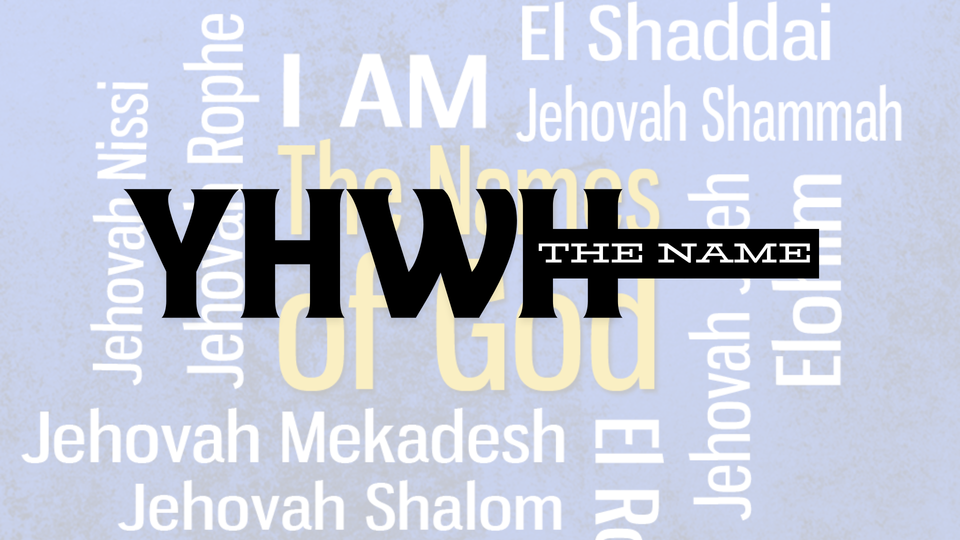His Forever Name

There has never been a time in history when the sacred name of God has not been debated. It's one of those mysteries that will forever challenge man's intellect and reasoning. Lives have been lost defending a particular interpretation of the Tetragrammaton, YHWH's sacred name. Even in our contemporary times, we use names meant to be a reflection of God's character and nature. They can enlighten us, build our faith, and more. Many of the names we use to refer to YHWH are given to sacred places or things in the Old Testament, or an element of His character, or descriptors of YHWH's relationship to His covenant promises.
The "personal name of God", the Tetragrammaton [YHWH אֶהְיֶה], unlike titles such as "God" is considered to be a distinct, personal, and divine name by which God revealed Himself to Moses in Exodus 3:13-15:
Then Moses said to God, “If I come to the people of Israel and say to them, ‘The God of your fathers has sent me to you,’ and they ask me, ‘What is his name?’ what shall I say to them?” God said to Moses, “I am who I am [אֶהְיֶה YHWH]. And he said, “Say this to the people of Israel: ‘I am [אֶהְיֶה] has sent me to you.’ ” God also said to Moses, “Say this to the people of Israel: ‘The Lord, the God of your fathers, the God of Abraham, the God of Isaac, and the God of Jacob, has sent me to you.’ This is my name forever, and thus I am to be remembered throughout all generations.
In this passage, we see two names that God gives himself, emphasizing the second in a decree. In two more places, we find him declaring this same name of LORD.
And he said, “I will make all my goodness pass before you and will proclaim before you my name ‘The Lord [YHWH אֶהְיֶה].’ And I will be gracious to whom I will be gracious, and will show mercy on whom I will show mercy. (Exodus 33:19)
“I am the LORD [YHWH אֶהְיֶה]; that is my name! I will not yield my glory to another or my praise to idols. (Isaiah 42:8)
Below is a list of some of the more common names we may use or hear referring to the LORD [YHWH], their origin in Scripture, and their meaning in context. By studying the names of God in the Bible and their meanings, we gain insights into who God is and how He relates to us. I'm using the English Standard Version (ESV) as my main reference. Other sources are noted as needed.
Before you go any further, let me point out that biblically, God has one name - YHWH. All the “names” on these lists really are ways to describe YHWH’s character or activities.” Keep that in mind as you look at some of the "Names of God" we might use or hear others use. Determine for yourself if the popular name is God's Name or if it describes His character, activity, or His relationship to His covenant promises. See if you can tell the difference.
Jehovah Jireh: The Lord Provides
Reference: "So Abraham called the name of that place, 'The Lord [YHWH אֶהְיֶה] will provide'; as it is said to this day, 'On the mount of the Lord [YHWH אֶהְיֶה] it shall be provided." (Genesis 22:14)
Jehovah Nissi
Reference: "And Moses built an altar and called the name of it, The Lord [YHWH אֶהְיֶה] Is My Banner, saying, 'A hand upon the throne of the Lord [Yah יֶה]! The Lord [YHWH אֶהְיֶה] will have war with Amalek from generation to generation.” (Exodus 17:15)
Jehovah Shamma: The Lord is There
Reference: "The circumference of the city shall be 18,000 cubits. And the name of the city from that time on shall be, YHWH [אֶהְיֶה] Is There.” (Ezekiel 48:35)
Jehovah Shalom: The Lord is Peace
Reference: "Then Gideon built an altar there to the Lord [YHWH אֶהְיֶה] and called it, The Lord [YHWH אֶהְיֶה] Is Peace." (Judges 6:24)
Jehovah Rapha: The Lord Our Healer
Reference: "If you will diligently listen to the voice of the Lord [YHWH] your God [elohim], and do that which is right in his eyes, and give ear to his commandments and keep all his statutes, I will put none of the diseases on you that I put on the Egyptians, for I am the Lord [YHWH אֶהְיֶה], your healer [physician].” (Exodus 15:26)
Jehovah Rohi: The Lord Our Shepherd
"Reference: The Lord [YHWH אֶהְיֶה] is my shepherd; I shall not want." (Psalm 23:1)
Jehovah Tsidkenu: The LORD Our Righteousness
Reference: "In his days Judah will be saved, and Israel will dwell securely. And this is the name by which he will be called: ‘The Lord is our righteousness [ YHWH tsedeq יְהוָֹה צִדְקֵנוּ]" (Jeremiah 23:6 ESV)
Though not an exhaustive list, here are more names with which you may be familiar or use to address or refer to the Lord. Please feel free to do your own research and, looking at the references in context, ask yourself the question: Are these names God declares as His Name, or are they words, places, or descriptions of His character and nature?
- YHWH Mekaddesh (Exodus 31:12-13)
- YHWH Sabaoth (1 Samuel 1:3)
- YHWH Selah (Psalm 18:2)
- El Shaddai (Genesis 17:1-3)
- El Elyon (Genesis 14:17-22)
- El Roi (Genesis 16:11-14)
- El Olam (Genesis 21:33)
- El Gibbor (Isaiah 9:6)
An interesting point about the tetragrammaton is that Jews have been forbidden to pronounce or write it out of reverence, a practice that goes back centuries. When reading biblical passages in which YHWH is written, their most common practice is to substitute either the word Adonai, the Hebrew word for Lord or Master, or HaShem, meaning simply “the name.”
We should all be very aware of context when quoting Scripture. Just because a pastor or teacher says something is so doesn't mean we are excused from doing our own research to learn the context and the origin of what we've heard. In the case of the Name of God, it seems that we should be especially careful not to make assumptions, misapplications, or declarations out of context. The Name of the Lord is hallowed, holy, sacred, and should be honored, revered, and carefully guarded from misuse or abuse.
The utmost reverence for the name of YHWH practiced by Jews since ancient times should encourage us to carefully think before we speak about the Most High God or use His name ... His name is YHWH.







Member discussion